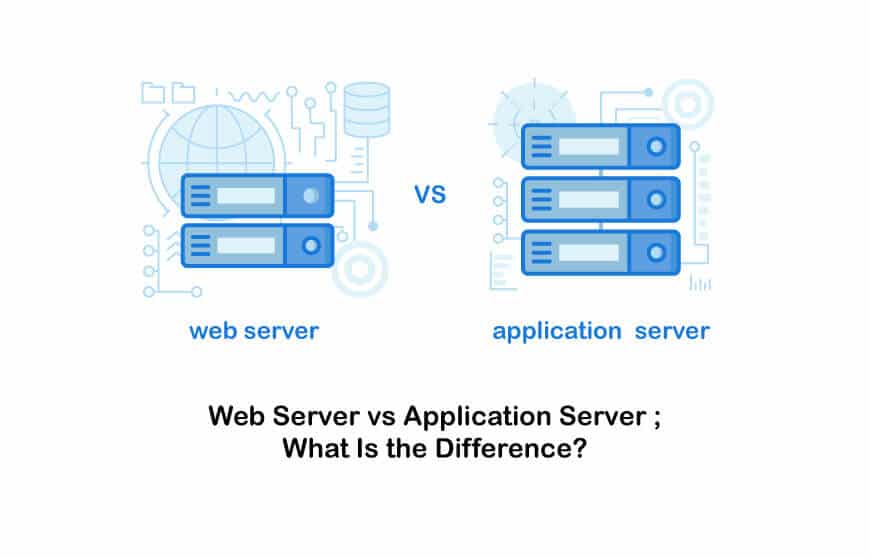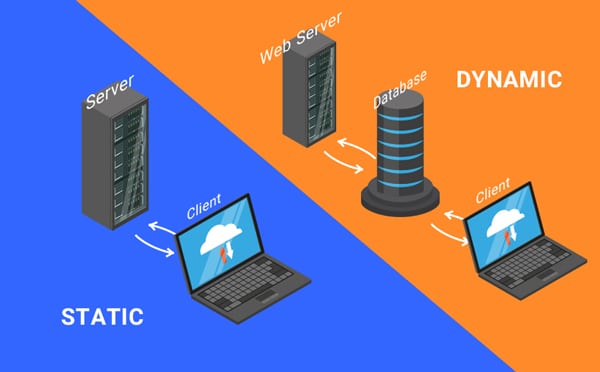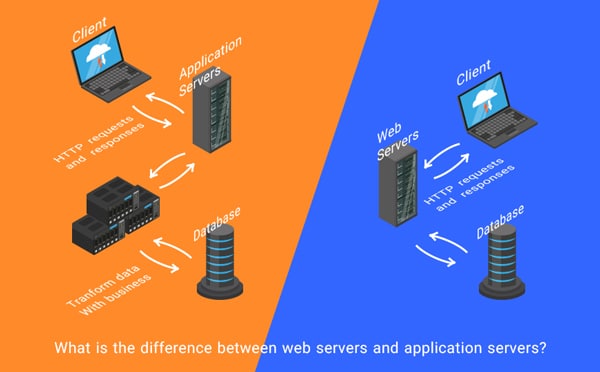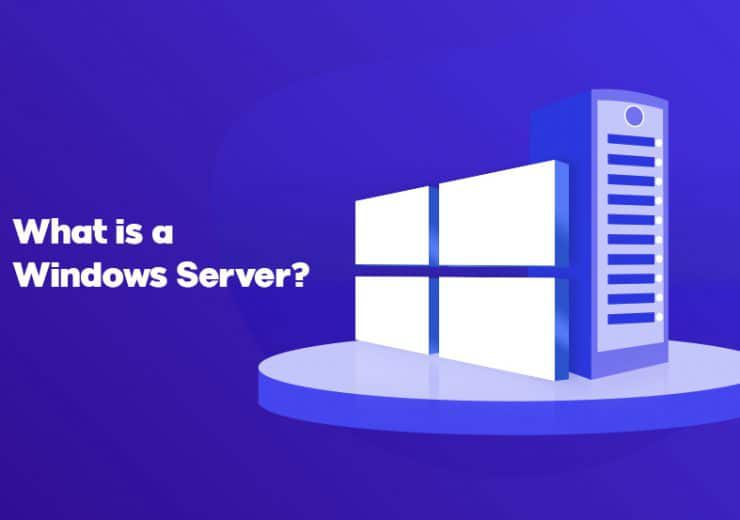What Is the Difference Between Web Server vs Application Server?

Many people avoid going into details regarding understanding various technical terms and how they can relate to each other. Although the words can be as easy as pie for tech-savvy individuals, others may find it frustrating. After all, knowing those complicated definitions will never come in handy for them.
Two of the common phrases used in activities related to websites are web server vs. application server. Here we have shed light on the definition of each server, the difference between the application server and web server, similarities, and the way they can be used best for different purposes.
What Is a Web Server?

Before we jump into explaining the differences between these two types of servers, we first have to mention what is application server and the web server are. A web server is typically a technology that lets users, either desktop or mobile, see the website that they have searched for its URL. More specifically, it handles HTTP, processing the client request and displaying the web page.
If you are willing to know what is a web server, this article can help you!
An average user may not even need to understand this concept and how it functions unless he wants to launch a website and opt for a hosting service. If you are a regular website user like so many others around the world, having a web server for your own is not recommended in any way. That’s because the requirements for running such a service are far beyond what can be provided in an office or home. Web servers are significant, and they should be kept in conditions that don’t cause overheating and need special maintenance that professional technicians and experts must carry out.
Web hosting companies cover the mentioned conditions and rent a portion of the server’s space at various fees. The web servers’ activity is done in the background. So, neither the website owner nor the users have anything to do with it.
What Is Web Application Server?

The application server is a software service that runs web and desktop applications. While a web application server is associated with more technical terms, it is a framework that consists of a series of codes that build and run the dynamic content.
It is primarily used for websites that include dynamic elements and features. These features refer to parameters that are not always the same and can be changed based on factors such as the user’s location. This server can also be utilized for other applications and platforms like mobile application servers. Mobile application servers are likewise growing with the increasing use of mobile devices. They perform as a central component between the device and backend. It improves the functionality and visibility of different web pages or application elements on the device that has sent the request to the server.
Mobile devices, unlike personal computers, have some limitations in resources. Mobile application servers ensure the program’s mobile version or website functions properly using the available connectivity capacity, bandwidth, and power. This server also benefits businesses that use mobile technology by providing access, update, and security features.
If you wonder what an application server is, don’t miss this article!
Web Server vs Application Server Difference
| Sr. No. | Key | Web Server | Application Server |
|---|---|---|---|
| 1 | Purpose | Web Server contains Web compartment as it were. | Application Server contains Web Container in addition to EJB Container. |
| 2 | Resource Consumption | Web server consumes fewer assets like CPU, Memory, and so on when contrasted with the application server. | Application server uses more assets. |
| 3 | Useful | A web server is excellent if there should be a static substance like static HTML pages. | The application server is significant in active substances like bank sites. |
| 4 | Target Environment | Web Server gives the runtime climate to web applications. | Application server gives the runtime climate to big business applications. |
| 5 | Multithreading support | Multithreading isn’t upheld. | Multithreading is upheld. |
| 6 | Protocol(s) supported | Web Server upholds HTTP Protocol. | Application Server suppots HTTP just as RPC/RMI conventions. |
| 7 | Example | NGIX, IIS. | Weblogic, JBoss. |
Even though these two types of servers have similar functionalities, there are some differences between web servers and application servers in some aspects described below.
Any person who wants to understand the difference between a web server and an application server should look at these. These are the most prominent differences that we can see as of now. Upon the analysis of application server vs web server differences, you can make the right decision on what type of server you should be using.
- Web servers are designed to accept HTTP requests from clients and provide them with HTTP responses. However, application servers will be able to pass business logic to the clients and use that to generate dynamic content. Web servers are designed to accept HTTP requests from clients and provide them with HTTP responses. However, application servers will be able to pass business logic to the clients and use that to generate dynamic content.
- You can use web servers to create static, dynamic, or hypertext documents. However, the application servers are using them to generate text documents based upon data provided to them. This is another difference between the application server and the webserver.
- You can find a noticeable webserver vs app server difference in the consumption of resources. Web servers are usually consuming lesser resources when compared to application servers.
- Another difference between server and web server is the usage of protocols. A web server would be providing support to HTTP and HTTPS protocols. However, the application servers support HTTP, HTTPS, RPC, and RMI protocols. When you deep dive and explore the differences between webserver vs HTTP server, you will figure this out.
- When you look at the webserver and application server examples, you will figure out that a web server is responsible for delivering an environment for running a web application. However, an application server will provide a complete environment to run the web and numerous enterprise applications.
If you aim to make a vps hosting comparison , click on the link provided!
%22%20transform%3D%22translate(1.2%201.2)%20scale(2.34375)%22%20fill-opacity%3D%22.5%22%3E%3Cellipse%20fill%3D%22%230052ff%22%20cx%3D%22252%22%20cy%3D%22108%22%20rx%3D%22125%22%20ry%3D%22125%22%2F%3E%3Cellipse%20fill%3D%22%23f90%22%20rx%3D%221%22%20ry%3D%221%22%20transform%3D%22matrix(78.90078%20-210.39616%2069.64645%2026.11815%2046.8%2063.6)%22%2F%3E%3Cellipse%20fill%3D%22%23ff8719%22%20rx%3D%221%22%20ry%3D%221%22%20transform%3D%22matrix(-106.96028%20231.48326%20-58.43412%20-27.00035%2025.1%2079.3)%22%2F%3E%3Cellipse%20fill%3D%22%231f5ef1%22%20rx%3D%221%22%20ry%3D%221%22%20transform%3D%22rotate(7.4%20-454%201833.5)%20scale(74.92912%20213.26947)%22%2F%3E%3C%2Fg%3E%3C%2Fsvg%3E)
Some other differences are worth mentioning:
1-Higher Capabilities of Application Servers
The first web server and app server difference is that application servers work with more protocols than HTTP. While the web servers are intended to process the HTTP requests, application servers can take functionality to a higher level. They can work with websites alongside other programs and add a layer of higher adaptivity to the delivered information.
Moreover, application servers have the capability of activating additional functionalities. They support more advanced website features such as transactions, messaging services, and customization of various elements. These functions are now becoming an inseparable part of the sites, and they are available thanks to application servers.
Check out this article if you aim to find a good domain name!
2-Use of Web Servers for Static Content
The other difference between web and application servers is that web servers on their own only provide the static pages you can see on a website, and other technologies rather than the web servers support the dynamic components. The outcome of a web server is the same in all conditions, regardless of the device the user is using, the location, and other adaptive components. Considering these descriptions, we cannot separate these two servers from each other. Generally, they are both required simultaneously and give us the results we want as a package deal.
If you aim to know the difference between web hosting and website builder , check this article out!

If you want to know about what does ddos do , check this article out!
3-Web Servers Can Be a Part of Application Servers
Web servers are often implemented inside the application servers performing various tasks such as enabling the HTTP protocol. In some cases, a web server creates the necessary components of the functionalities we see from the application servers.
A fast-loading website can benefit from both technologies where the web servers handle the static load, caching, and other simple requests. Meanwhile, the application servers take care of other advanced features and complex requests. This way, more straightforward requests won’t reduce the speed of the application server, and the overall functionality will be improved. In simple words, as earlier pointed out, whenever you hear application servers, you can consider a web server as a single part of them.
If you aim to compare the dedicated hosting meaning , check this article out!
4-Application servers can enable additional functionality.
The websites and applications that use application servers often need to provide features that go beyond the static functionality web servers offer. Application servers can enable features like transactions, personalization, and messaging services. These enhanced features are increasingly used and expected for websites of all types.
5-It’s Not Either-Or
The framing of “application servers vs. web servers” isn’t accurate. Generally speaking, it’s not a matter of choosing between the two or deciding which is better. Most of the time, they’re a package deal.
6-Application servers can contain web servers.
Web servers are usually one part of an application server. In addition to the other functionality they provide, they also tend to enable HTTP protocol. Sometimes the webserver function is an essential part of the other features an application server offers. When you hear someone talk about application servers, you can often assume a web server is one part of what they’re describing.
7-Web servers and application servers often work in tandem.
Even though many application servers include a web server, application servers are most commonly used alongside web servers. You can get speedier and better results by having a web server that takes care of the static portion of serving up a website and an application server that handles any dynamic functions. Web servers can handle caching and simple requests that don’t require much bandwidth, leaving the application server to exert its power only on the more complex requests that need it. That way, simple web requests don’t overtax or slow down the application server, and both pieces of the overall solution do their jobs better.
Developers can ensure that a website recognizes which requests only require the web server and can incorporate a filtering technique to identify dynamic content requests and automatically forward them to the application server. By working together, the two types of technology provide better results all around.
8-Server basics or basic syntax
Web servers refer to equipment or programming, or both, that deliver materials or management to end customers through the World Wide Web. It increasingly resembles a program that demands a response to a system close to Web assets via an HTTP contract and is also known as a web server. Then again, the application server is a section-based programming structure that encourages the improvement and execution of online applications. Overall, this is a central-level server application that intends to provide sound business logic to applications.
Suggest you read our article about what is apache tomcat
App Server vs Web Server Similarities
Despite the application and web server differences mentioned, the two servers cannot be considered separate concepts, and they are alike. Both function as an interface between what users can see and the backend that keeps a website running smoothly. They change the technical side to the visible elements that regular users and designers can understand. Above all, they both power the web that we all use every day in different aspects of life.
If you are willing to know who owns a domain , don’t miss this post!
So, What Do I need?
Based on the differences between the application server and the webserver mentioned, what you need as a user, is a reliable web hosting service provider who handles both servers to bring you the best experience. A good company brings you useful features and bandwidth to efficiently cover static and dynamic needs. There is a substantial market for web hosting plans, and you should choose an excellent service that leaves no worries for you.
To paint a picture, consider the below factors before selecting an appropriate service for your website.
If you aim to know windows server 2019 feature updates, don’t miss this article!
Uptime
The most important expectation of users from hosting companies is a permanent website. Although the web servers need to go offline from time to time for maintenance, a reliable company ensures that it happens rarely. Generally, the company should provide you with an uptime above 99% so that you won’t lose your audiences and revenues.

Simple Interface
If you are interested to know what is internet information services , don’t miss this post!
Security and Support

Also, you should choose a company that can offer 24/7 support when you face problems with the website and server. You don’t need to shoulder the responsibilities of the technical side related to your site. Having consistent access to a support team for unexpected issues relieves your mind of keeping your website always at its peak condition.
If you aim to know about what is SSL certificate in website , check this article out!
How do App Servers and Web Servers Work Together?
You should also understand how they work together to understand the webserver vs. application server difference. A website can have both static content and dynamic content. Static content will be stored in a web server. However, the dynamic range will be stored within an application server. A load balancer and a reverse proxy are available in the web servers to direct traffic to the appropriate server accordingly. This direction will depend on the nature of content requested by a user. However, you can also find a load balancing algorithm written to deliver this functionality. Most of the load balancers available out there also contain reverse proxy sensors. This would simplify the overall architecture of an application server.
If you are interested to know the easiest website builder for beginners, don’t miss this post!
Frequently Asked Questions
Is Apache a Web Server or Application Server?
One of the most common questions among users is whether Tomcat is a web server or an application server? It is a web server that is designed to serve static web pages. Tomcat is an app server responsible for helping java applications to get the other hand.
Why We Need Web Server in Front of Application Server?
Now you are aware of how these two types of servers are functioning. Tomcat would work fine when handling the user requests and delivering them to the pages accordingly. However, it would help if you had a proper front-facing web server (such as Apache) to apply the functionalities of your web application, therefore.
Conclusion
In this article, we tried to provide a good understanding of the webserver vs. application server differences. This understanding will help you to design the server architecture accordingly. As a result, you can develop adequately functioning websites or web applications with optimum server architecture.
Understanding the difference between application and web server can be valuable knowledge, but you won’t ever need to choose between them. All you need to take into consideration is choosing an excellent hosting service from a reputable company. By leaving the responsibility of the server-side to your hosting company, you can focus on creating a fantastic website for your business.





